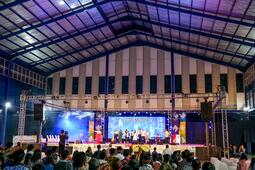Posted: August 26, 2015
Harrisburg, Pennsylvania, USA – Applying for a visa to enter the U.S. is serious business for many internationals hoping to attend PA 2015, the Mennonite World Conference (MWC) Assembly to be held here July 21-26.
A Visa Task Force – with two members on the ground in Africa, one who moves between Africa and North America, four in Asia, and two in Latin America – assists visa applicants in completing their paperwork and prepping for their embassy interviews.
Judy Zimmerman Herr and Bob Herr, who lead the group, are based in the U.S. They organize letters of invitation from MWC, which applicants can use as part of their interview process when applying for a visa, and they maintain a link to the office of Customs and Border Protection, assisting with good communication for people who will be arriving at U.S. borders.
The U.S. requires visas from 44 countries where members of MWC churches live. The investment for individual visa applicants is substantial - $160 USD in most places. Travel costs to consulates or embassies are on top of that.
A majority of the applicants are obtaining visas. For example, the word from Latin America is that many are getting visas, including all demographics. In general, throughout the world, those who have traveled outside their countries before are not finding it difficult to receive visas.
However, Task Force members observe some patterns in visa denials – those who do not own land, who do not have a career or steady work, who do not have a spouse and children in the country issuing their passports, or who have never traveled outside their country, are more likely to be turned down. But there are frequent surprises, as the following stories illustrate.
- “Mrs. A. had attended the last MWC Assembly in Paraguay as a member of a choir who had sung there. The choir was hoping to sing again at PA 2015. In her embassy interview a few weeks ago, she was asked a series of questions in a local language and answered them in that language. Her visa was denied. She would not accept the denial, quickly switched her language to fluent English, and refused to take back her passport, asking again why she was denied. To avoid creating a scene, the interviewing officer asked her to come back the next day to collect her visa. When I picked up her passport for her the next day, the first thing I checked was whether her visa was present, and it was!” The Herrs note that how applicants present themselves often is quite influential.
- “It was heartbreaking to watch my own pastor be denied a visa. Twice. In my country, a pastor’s wife is also considered a pastor, although she has no paper credentials to verify this. So she was denied, too.”
- “Three young women who are currently living in Canada, but come from a country that requires a U.S. visa, traveled to a U.S. consulate in another city in Canada for their visa interviews. When they arrived, they learned that the interviews had mistakenly not been booked. However, the folks at the consulate said, ‘But these women traveled all this way, so we need to give them their interviews.’ They made space in their schedule, and all three were granted their visas.”
- “A group of 18 women and one man landed at my home one night around 9:00, wanting a place to sleep. The communication had said that they would need a place to “wash their faces.” My wife and I opened up every space we had to accommodate them. In the morning, they turned our home into a church service with song and prayer. It was good. But of the 19, only two women got their visas. I was very sad. I can imagine 17 participants in a hired bus, traveling 440 km back home, having been denied. We had rented space in an Internet Café and assisted them with their DS-160 application forms. Where did we go wrong?”
- “A particular brother was my partner in the whole process, having volunteered to encourage church members to attend PA 2015. He organized a group of six, including himself and his wife. His pastor was part of the group. Four of the six were interviewed by one officer and were granted their visas. My friend and his wife were interviewed by a different officer, and they were denied. They haven’t decided whether to reapply or not.”
- “A pastor from a rural area had a lot of interest in attending PA 2015. He went through all of the application steps, and on the day of his interview, security agents at the embassy helped him go through security so he wouldn’t be late for his interview. When the consular officer met with him, he told the pastor that he had no fingerprints, and regretfully, he couldn’t grant him a visa. Without fingerprints, the embassy would not have a digital identity for him on file. This brother had worked in construction since he was very young. During the last seven years, he worked in his family’s brick-making factory. He had worn his fingers down so that he had no fingerprints because of the hard work he had done since his youth in one of those jobs.”
- “Eleven people from an especially remote and very poor region of one country registered to attend PA 2015. Although I encouraged them to do this, I also really wondered if they would possibly get visas. Most of the people in the group had not traveled outside of the country before, and they were getting their passports for the first time for this occasion, too. They traveled to the capital city (an hour flight, or a 20-hour bus trip) for their visa appointment. I was thrilled when all 11 of them walked into my office with smiles on their faces, all of them having received their visas.”
Many interviews are yet to be held during the next few weeks leading up to the Assembly. Because the outcome for many visa applicants is still uncertain, persons and countries are not identified in these stories from the Visa Task Force.
Challenges remain for many traveling to PA 2015, even after a visa has been granted. Visa Task Force members ask for prayer in these areas:
- Continue to pray for all of those who will have their embassy interviews in the next few days and weeks.
- Pray for people’s entry into the U.S. This is often a stressful process, because people who rarely cross borders or deal with immigration officials are not used to answering personal questions.
- In many cases, it is very difficult for those who have been denied visas to be generous toward those who have been issued a visa. Pray for peace and goodwill for all involved.
- Some US Embassies are having technical glitches/problems issuing visas, with a number of visa interviews needing to be rescheduled. For those still waiting for their visa interview, the schedule may be tight and uncertain.
In summary, MWC officials are grateful that the majority of applicants are receiving visas. The biggest challenges remain, as expected, for persons who have never traveled outside their home country before or who are young enough not to have a job, spouse or significant assets to return to.
MWC release by Phyllis Pellman Good, a writer and editor for Mennonite World Conference



Join the Conversation on Social Media
FacebookTwitterInstagramFlickrYouTube